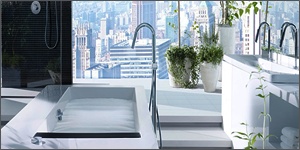Europe's largest sanitaryware maker Grohe to be sold to Japan's Lixil for $4-bn
27 Sep 2013
Europe's largest sanitary fittings maker Grohe AG yesterday agreed to be acquired by Japan's largest manufacturer of building materials Lixil Corp and the Development Bank of Japan (DBJ) for €3.06 billion ($4.1 billion).
 The acquisition is the largest ever German investment by a Japanese company to date.
The acquisition is the largest ever German investment by a Japanese company to date.
Tokyo-based Lixil and state-backed DBJ have formed a 50-50 joint venture to buy 87.5 per cent of Grohe from private equity firms TPG Capital and DLJ Merchant Banking Partners, a unit of Credit Suisse, for €3.06 billion including debt.
The proposed deal comes a few months after Lixil agreed to buy US bathroom fixtures company American Standard Brands for $342 million, and had acquired Italian construction company Permasteelisa in 2011 for €570 million.
It is also be the biggest acquisition in Germany by a Japanese company after electronics components and digital storage products maker TDK Corp purchased its German rival Epcos AG in 2008 for $1.9 billion. (See: Japan's TDK to acquire Germany's Epcos for $1.9 billion)
For Lixil, the deal will help it to expand its footprint in Europe since Grohe generates 85 per cent of its annual sales of €1.4 billion outside of Germany, and also in Asia, where Grohe has operations in China, Indonesia and Thailand.
Grohe already has a big presence in China after it acquired a 72.3-per cent stake in 2011 in leading Chinese sanitary fittings producer Joyou, which sells its products through a network of over 4,000 distributors.
Lixil said that it will now offer to buy the remaining of publicly-listed Joyou, and it founders, Jianshe Cai and Jilin Cai, will remain invested in Grohe, and will continue to lead the business they founded in 1988.
TPG Capital and Credit Suisse, which acquired Grohe in 2004 from BC Partners for €1.5 billion, were running a dual-track process of either selling the company or a stock market listing.
Grohe's owners, had valued Grohe, Europe's biggest sanitary fittings maker, at up to €4 billion ($5 billion) including debt, and would have opted for an IPO if a deal did not materialise.
Earlier this month, Reuters reported that five suitors, including Switzerland's Geberit, Lixil, Brazil's Duratex and two private equity firms had submitted final bids for Grohe.
Founded by Friedrich Grohe in 1936, Grohe manufactures and sells a full range of sanitary products and systems for residential, public and commercial installations.
It is a European market leader and one of the top three international manufacturers of sanitary fitting and has nine production plants in six locations including three in Germany, and one each in Portugal, Thailand and Canada and three in China.
The Dusseldorf-based company sells its products in 130 countries, and has a global market share of around eight per cent.
Lixil is Japan's largest manufacturer of building materials and housing equipment with net sales of €10.8 billion in fiscal year 2013.
Its portfolio includes solutions in housing and lifestyle and an extensive product lineup from windows, tiles, front doors, kitchens, bathrooms, and toilets under the brand name of American Standard, Inax and Tostem.
In Japan, Lixil is the biggest housing and building materials company with top share in eight different categories.
In the global market, its operations are led by group companies, such as Permasteelisa Group, which has strong presence in the curtain wall business with unmatched technology and designs.
Their projects in the US, include New York by Gehry, One Bryant Park in New York and San Francisco Federal Building.
''Grohe is one of the most well-known brands in the global sanitary market,'' said Lixil's president and CEO Yoshiaki Fujimori. ''In addition to its high quality standards, Grohe has received high acclaim globally for its leading product design and innovation across a wide range of bathroom, shower and kitchen solutions covering the biggest share of the water technology market.''
Fujimori, a former General Electric executive, said that he plans to buy the DBJ's stake in the JV in three to five years.
Grohe's CEO David Haines, who has signed a new five-year contract to run the company, said, ''Our merger with Joyou has provided us with differentiated access to China – we are now excited about the prospect of accessing further markets through our new partners in Japan and creating a broad platform for collaboration across borders and product lines.''
Lixil will fund the deal through ¥220 billion in loans from Japan's three biggest banks, including the Mitsubishi UFJ Financial Group.


















